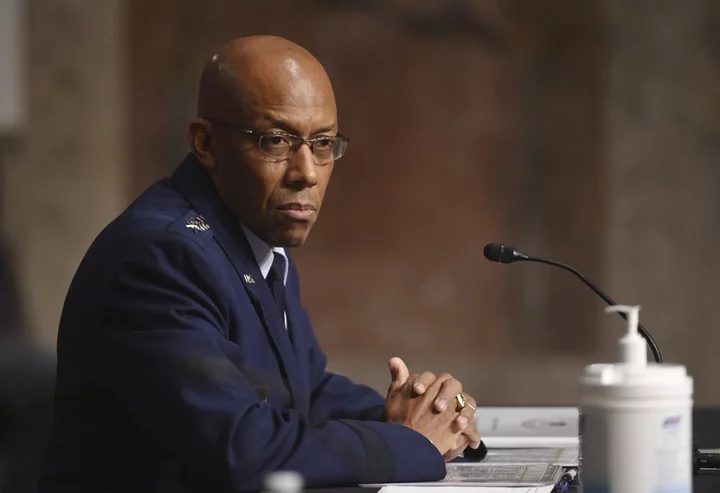The Biden administration’s pick for the top US military post said an Alabama senator’s decision to block hundreds of officer promotions is hurting the Pentagon’s ability to hold on to talent and jeopardizes readiness.
General Charles Q. Brown Jr., the nominee to be the next chairman of the joint chiefs of staff, said military families have to weigh the desire to serve against the uncertainty caused by Republican Senator Tommy Tuberville’s refusal to allow the promotions to proceed swiftly.
“We have more junior officers who now look up and say, ‘If that’s the challenge I’m going to have to deal with in the future, I’m going to balance between my family and serving in a senior position,’” Brown told the Senate Armed Services Committee on Tuesday. “And we will lose talent.”
Tuberville is using Senate rules to stand in the way of what is normally routine Senate confirmation for military officer promotions. As of last week, that’s kept 265 nominees — about 31% of the high-ranking officer corps — from moving up. Because of Tuberville’s holds, the Marine Corps finds itself with an acting Commandant for the first time in more than 100 years. General David Berger retires Tuesday.
Austin Warns US Military at Risk by Senate Block Over Abortions
Tuberville didn’t make any reference to his holds when he questioned Brown at Tuesday’s hearing. He’s said in the past he’ll stop his delays only if the Pentagon rescinds a policy, announced last year, of paying for service members to travel to obtain abortions following the Supreme Court’s decision to overturn Roe v. Wade.
After the hearing, Tuberville told Bloomberg News that Brown was a qualified candidate and did “very well” answering questions. Tuberville said he would vote in favor of Brown if his nomination comes to a formal vote but gave no indication he’ll stop blocking the other promotions.
If confirmed, Brown, who currently serves as Air Force chief of staff, would replace General Mark Milley as the US’s most senior military officer. His appointment comes as the US continues to arm Ukraine in a bloody war of attrition against Russia and as Washington finds itself locked in an intense competition with China.
Brown said that the ongoing conflict in Ukraine had provided valuable lessons for the US military. Those lessons, he said, include the importance of information in warfare; the crucial role of morale and the “will to fight;” and the benefits of integrated air defense. The conflict has also highlighted the value of logistics, he said.
“I think the Russians learned, if you don’t pay attention to the logistics, it’s hard to win and hard to move forward,” Brown said.
Author: Peter Martin, Tony Capaccio and Roxana Tiron









